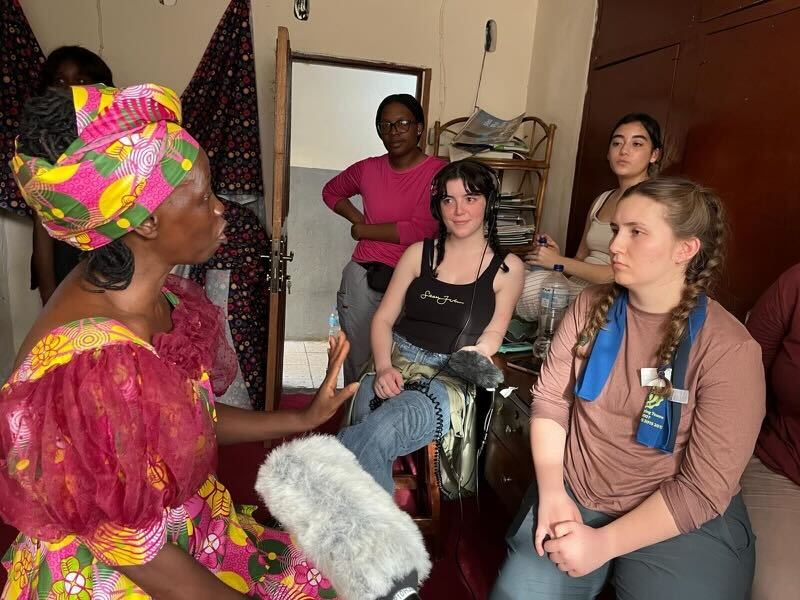In the Grainger Engineering Library, a line of tables was filled with students signing forms, i-cards in hand, waiting to be vaccinated for the flu.
As part of the McKinley Health Center’s mobile flu clinic, this event, along with others around campus this fall, was set up with the intention of getting the vaccination out to as many students as possible, said Vicki Burkhalter, the center’s immunization coordinator.
“They know if the flu season is a rough season it’s going to take a toll in the campus community,” Burkhalter said.
Flu shots are available for free to any student, staff member or retiree with an I.D. Additionally, students must have paid the student health fee and staff members must show an insurance card from a state-sponsored health plan.
To maximize impact, the clinic tries to go to heavily populated areas on every side of campus.
Get The Daily Illini in your inbox!
“The philosophy is that we want to get that flu shot out there,” Burkhalter said. “We hit every geographic region.”
Since the flu is contagious, students in crowded areas like residence halls, lecture halls or campus recreation facilities are susceptible to the flu. The mobile clinic aims at going to those areas, Burkhalter said.
Adding to the risk, the age range of people on college campuses are among the least likely to be vaccinated.
According to the Centers for Disease Control, 28.6 percent of people aged 18 to 49 received flu shots during the 2011 to 2012 flu season, which is the lowest vaccination percentage of any age demographic included in the study.
Last year Burkhalter approximated that the center gave out about 11,000 flu shots total, the majority going to students.
There are various reasons why students might choose not to get the flu shot, Burkhalter said, ranging from fear of needles to procrastination.
Convenience could also be a factor, as many student do not want to go out of their way to get the shot.
Elaina Plinke, a sophomore in Business, was not planning on getting her flu shot, but received one at Tuesday’s vaccination event at Grainger because she was already there.
“I think usually (students are not vaccinated) because it’s inconvenient, but I feel like there’s no reason if it’s so easy like this,” Plinke said.
By going around campus, the clinic hopes to make the shot as accessible to students as possible, and also raise awareness that the shot is available, Burkhalter said. By increasing the awareness of the clinic, Burkhalter said the clinic hopes to give out at least 11,500 shots this year.
Viral Patel, a sophomore in DGS, said that he “probably would not” have gotten his flu shot if he could not have gotten it at Grainger.
“I just came by and saw that they were having flu shots today so I decided just to go for it,” Patel said.
Getting the flu shot protects students not only from the unpleasantness of getting sick, but also missing classes, Burkhalter said.
“I can’t imagine missing an entire week or just having to make up all the work … or (being) in class not being able to focus because you have the flu,” said Meghan Orr, a sophomore in LAS.
Orr, who did not regularly get her flu shot before coming to college, sees getting vaccinated as common sense.
“It took 10 minutes of my time and I had a sore arm for a day,” Orr said. “If you weigh that against being miserable with the flu for a week and being miserable with all the class stuff you missed in that week, the math works out.”
Getting the shot early is helpful, Burkhalter said, as the vaccination reaches its full strength after about two weeks. After that the shot is active for an entire year. According to the CDC, the flu season peaks in February but picks up strength in December.
“With my luck, I would get sick around midterms week, so that would have been pretty bad,” Patel said.
Burkhalter said that turnout for flu shots this year has been fair so far, and interest can vary based on weather.
“It’s been warm, sunny weather, so that’s always hard to draw students in because of course, if it’s sunny they’d rather be outside doing something more pleasant,” Burkhalter said. “But we find when the weather gets a little nippy, the leaves are falling, it’s raining and it’s a little bit miserable outside, the population in general gets a little more aware that, ‘Hmm, it might be the flu season.’”
Miranda can be reached at [email protected].









